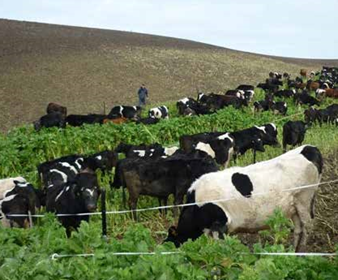 The intensive winter grazing (IWG) consents applied for can be for up to the next three to five years.
The intensive winter grazing (IWG) consents applied for can be for up to the next three to five years.
ORC’s Manager Consents Joanna Gilroy says that farmer engagement since November had been “really good so far”, but to ensure consents are in place by 1 May , she urges farmers to begin the application process now – which to date has been averaging five working days to get completed.
“A lot of farmers are being both pro-active and innovative and are already working on having their
consents applied for and their grazing management plans in place,” Ms Gilroy says.
The new regulations around IWG started on 1 November 2022 and applications for winter 2023, and beyond, should be in by mid-April 2023 to ensure consents are in place by 1 May 2023. Minister for the Environment, David Parker, has ruled out any deferral of the regulations to a later date.
Catchment Advisors’ sessions with catchment groups
Ms Gilroy says the ORC’s Catchment Advisors and teams in Consents and Compliance are happy to do
site visits and have sessions with catchment groups, which have been “very successful” to date, she says.
“We’ve done more 20 sessions with catchment and farmer groups, and one-on-one visits, from September to December last year,” she says.
“The Council is here to help and has plenty of resources and people in place to support the farmers and their applications.
ORC’s Manager Environmental Implementation, Libby Caldwell says there is a steady demand from farmers wanting assistance with their IWG consent application, which includes their grazing management plan for winter 2023.
“There’s been requests for further IWG consents workshops, similar to last year, which we will be undertaking,” Mrs Caldwell says.
Consent should cover multiple years; three to five
Ms Gilroy says the application for consent should cover multiple years, with any consents then granted for a specific duration.
“In most instances we’re encouraging farmers to apply for consent for the next three to five years,” she says.
Farmers will then need to update their management plan annually, telling ORC where they have grazed in the previous year, and where they plan to graze during the next season. They only need to apply for the consent once.
While farmers need to apply for the paddocks they’re likely to graze over the next few years, actual paddock selection and the day to day farm operation is still in the farmer’s hands.
“The process we’ve developed provides for farmers to change their plan in response to the many factors which can influence day to day management,” Ms Gilroy says.
Online form, or postal options
ORC has introduced a bespoke process aimed at reducing the time and cost associated with processing IWG consents.
“There’s a lot of information on the ORC website to help farmers navigate the consent process.”
Ms Gilroy says farmers can use existing grazing templates, but notes ORC has prepared a template for use which they can access.
She says farmers can still undertake the activity without consent, but only if they can meet the permitted criteria in the regulations.
Catchment Advisors can be contacted on 0800 474 082
Advice can be sought from public.enquiries@orc.govt.nz
Good practice information including paddock plan and intensive winter grazing plan
New water rules winter grazing information including fact sheet
Ready to apply for a consent with pdf for intensive winter grazing plan and applications form
The IWG rules were introduced by Government as part of its wider Essential Freshwater package, with ORC responsible for implementing them.
